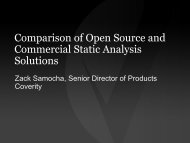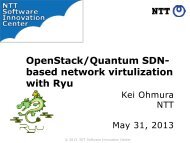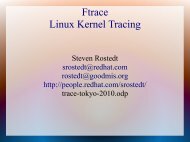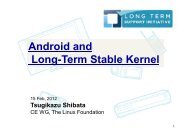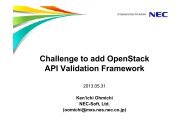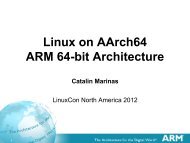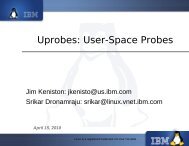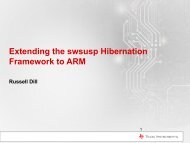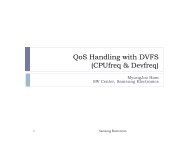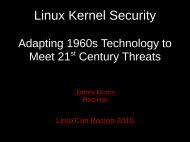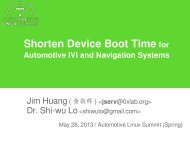RCU Callback Offloading - The Linux Foundation
RCU Callback Offloading - The Linux Foundation
RCU Callback Offloading - The Linux Foundation
Create successful ePaper yourself
Turn your PDF publications into a flip-book with our unique Google optimized e-Paper software.
Paul E. McKenney, IBM Distinguished Engineer, <strong>Linux</strong> Technology CenterMember, IBM Academy of TechnologyEnterprise End-User Summit 2013, New York, NY, USA May 14-15, 2013Bare-Metal Multicore Performancein a General-Purpose Operating System© 2012 IBM Corporation
<strong>Linux</strong> <strong>Foundation</strong> Enterprise End-User Summit, May 14-15 2013Group Effort: Acknowledgments Josh Triplett: First prototype (LPC 2009) Frederic Weisbecker: Core kernel work and x86 port Steven Rostedt: Lots of code review and comments, tracing upgrades Christoph Lameter: Early adopter feedback Li Zhong: Power port Geoff Levand, Kevin Hilman: ARM port Peter Zijlstra: Scheduler-related review, comments, and work Paul E. McKenney: Read-copy update (<strong>RCU</strong>) work (fun with “Hotel California” interrupts!) Thomas Gleixner, Paul E. McKenney: “Godfathers” Ingo Molnar: Maintainer Other contributors:– Avi Kivity, Chris Metcalf, Geoff Levand, Gilad Ben Yossef, Hakan Akkan, Lai Jiangshan, Max Krasnyansky,Namhyung Kim, Paul Gortmaker, Paul Mackerras, Peter Zijlstra, Steven Rostedt, Zen Lin (and probably many more)2© 2009 IBM Corporation
<strong>Linux</strong> <strong>Foundation</strong> Enterprise End-User Summit, May 14-15 2013What Do Database, HPC, and RT Developers Want?3© 2009 IBM Corporation
<strong>Linux</strong> <strong>Foundation</strong> Enterprise End-User Summit, May 14-15 2013What Do Database, HPC, and RT Developers Want?Get <strong>The</strong> #@#$#*!!! Kernel OutOf Our #@#$#*!!! Way!!!4© 2009 IBM Corporation
<strong>Linux</strong> <strong>Foundation</strong> Enterprise End-User Summit, May 14-15 2013What Do Database, HPC, and RT Developers Want?Get <strong>The</strong> #@#$#*!!! Kernel OutOf Our #@#$#*!!! Way!!!But we need device drivers.5© 2009 IBM Corporation
<strong>Linux</strong> <strong>Foundation</strong> Enterprise End-User Summit, May 14-15 2013What Do Database, HPC, and RT Developers Want?Get <strong>The</strong> #@#$#*!!! Kernel OutOf Our #@#$#*!!! Way!!!But we need device drivers.And file systems.6© 2009 IBM Corporation
<strong>Linux</strong> <strong>Foundation</strong> Enterprise End-User Summit, May 14-15 2013What Do Database, HPC, and RT Developers Want?Get <strong>The</strong> #@#$#*!!! Kernel OutOf Our #@#$#*!!! Way!!!But we need device drivers.And file systems.And memory protection.7© 2009 IBM Corporation
<strong>Linux</strong> <strong>Foundation</strong> Enterprise End-User Summit, May 14-15 2013What Do Database, HPC, and RT Developers Want?Get <strong>The</strong> #@#$#*!!! Kernel OutOf Our #@#$#*!!! Way!!!But we need device drivers.And file systems.And memory protection.And...8© 2009 IBM Corporation
<strong>Linux</strong> <strong>Foundation</strong> Enterprise End-User Summit, May 14-15 2013So What Are Us Poor Kernel Developers To Do???9© 2009 IBM Corporation
<strong>Linux</strong> <strong>Foundation</strong> Enterprise End-User Summit, May 14-15 2013So What Are Us Poor Kernel Developers To Do???For almost 20 years, my response was “Yeah, right, youreally do want the whole kernel, just admit it already!!!”10© 2009 IBM Corporation
<strong>Linux</strong> <strong>Foundation</strong> Enterprise End-User Summit, May 14-15 2013So What Are Us Poor Kernel Developers To Do???For almost 20 years, my response was “Yeah, right, youreally do want the whole kernel, just admit it already!!!”My first clue otherwise was <strong>Linux</strong>'s dyntick-idle system–(Used in battery-powered systems for years prior to <strong>Linux</strong>'s use.)11© 2009 IBM Corporation
<strong>Linux</strong> <strong>Foundation</strong> Enterprise End-User Summit, May 14-15 2013Before <strong>Linux</strong>'s dyntick-idle SystemCPU 0CPU 1Scheduling-ClockInterruptsBusy PeriodEndsBut CPU Remainsin High-Power State12© 2009 IBM Corporation
<strong>Linux</strong> <strong>Foundation</strong> Enterprise End-User Summit, May 14-15 2013Scheduling-Clock Interrupts Really Optional???Scheduling-clock interrupt primary purpose:–Check for other work from time to time–Prevent a given process from monopolizing the CPUBut if the CPU is idle, there is nothing for it to do anyway!!!Copyright © 2013 Melissa Broussard, CC BY-SA 3.0 (http://creativecommons.org/licenses/by-sa/3.0/us/)13© 2009 IBM Corporation
<strong>Linux</strong> <strong>Foundation</strong> Enterprise End-User Summit, May 14-15 2013<strong>Linux</strong>'s dyntick-idle SystemCPU 0Dyntick-Idle Mode EnablesCPU Deep-Sleep StatesEnter Dyntick-Idle ModeAt End Of Busy PeriodCPU 1Scheduling-ClockInterruptsVery Good For Energy Efficiency!!!14© 2009 IBM Corporation
<strong>Linux</strong> <strong>Foundation</strong> Enterprise End-User Summit, May 14-15 2013<strong>Linux</strong> Kernel Is Now Out Of <strong>The</strong> Idle Loop's Way...15© 2009 IBM Corporation
<strong>Linux</strong> <strong>Foundation</strong> Enterprise End-User Summit, May 14-15 2013<strong>Linux</strong> Kernel Is Now Out Of <strong>The</strong> Idle Loop's Way...So Can We Get It Out Of <strong>The</strong> Application's Way?16© 2009 IBM Corporation
<strong>Linux</strong> <strong>Foundation</strong> Enterprise End-User Summit, May 14-15 2013Is <strong>The</strong> Kernel Being In <strong>The</strong> Way Really A Problem?17© 2009 IBM Corporation
<strong>Linux</strong> <strong>Foundation</strong> Enterprise End-User Summit, May 14-15 2013Is <strong>The</strong> Kernel Being In <strong>The</strong> Way Really A Problem?For aggressive real-time workloads, scheduling clock tickdoes add measurable latency–Some insane people really are getting sub-20-microsecond real-timeinterrupt latencies out of the <strong>Linux</strong> kernel...–And I happen to strongly believe in encouraging that sort of insanity!!!18© 2009 IBM Corporation
<strong>Linux</strong> <strong>Foundation</strong> Enterprise End-User Summit, May 14-15 2013Is <strong>The</strong> Kernel Being In <strong>The</strong> Way Really A Problem?For aggressive real-time workloads, scheduling clock tickdoes add measurable latency–Some insane people really are getting sub-20-microsecond real-timeinterrupt latencies out of the <strong>Linux</strong> kernel...–And I happen to strongly believe in encouraging that sort of insanity!!!Some HPC workloads are sensitive to “OS jitter”–Especially iterative workloads with short iterations–And even more so on large systems booted with skew_tick=y19© 2009 IBM Corporation
<strong>Linux</strong> <strong>Foundation</strong> Enterprise End-User Summit, May 14-15 2013Iterative Workloads With Short Iterations: IdealWorkBarrierCPU 0CPU 1CPU 2CPU 3CPU 4CPU 5CPU 6CPU 7Time20© 2009 IBM Corporation
<strong>Linux</strong> <strong>Foundation</strong> Enterprise End-User Summit, May 14-15 2013Iterative Workloads With Short Iterations: OS JitterWork Barrier OS JitterCPU 0CPU 1CPU 2CPU 3CPU 4CPU 5CPU 6CPU 7Time21OS Jitter Multiplied by 7!!!And again!!!© 2009 IBM Corporation
<strong>Linux</strong> <strong>Foundation</strong> Enterprise End-User Summit, May 14-15 2013Now Try This With 800,000 CPUs In A Cluster...Work Barrier OS JitterCPU 0CPU 1CPU 2CPU 3CPU 4CPU 5...CPU 799,999Time22OS Jitter Multiplied by 799,999!!!And again!!!© 2009 IBM Corporation
<strong>Linux</strong> <strong>Foundation</strong> Enterprise End-User Summit, May 14-15 2013Yes, This Is A Real Problem For Some Workloads23© 2009 IBM Corporation
<strong>Linux</strong> <strong>Foundation</strong> Enterprise End-User Summit, May 14-15 2013<strong>Linux</strong> Kernel Is Now Out Of <strong>The</strong> Idle Loop's Way...So Can We Get It Out Of <strong>The</strong> Application's Way?24© 2009 IBM Corporation
<strong>Linux</strong> <strong>Foundation</strong> Enterprise End-User Summit, May 14-15 2013Josh Triplett's First Prototype, 2009Always turn off scheduling-clock interrupt for user codeGood demonstration of feasibility and benefit–2009 <strong>Linux</strong> Plumbers Conference presentation–http://linuxplumbersconf.org/ocw/proposals/103–See next two slides for performance comparison25© 2009 IBM Corporation
<strong>Linux</strong> <strong>Foundation</strong> Enterprise End-User Summit, May 14-15 2013Benchmark Results Before (Anton Blanchard)26© 2009 IBM Corporation
<strong>Linux</strong> <strong>Foundation</strong> Enterprise End-User Summit, May 14-15 2013Benchmark Results After (Anton Blanchard)27Well worth going after...© 2009 IBM Corporation
<strong>Linux</strong> <strong>Foundation</strong> Enterprise End-User Summit, May 14-15 2013But <strong>The</strong>re Were A Few Small Drawbacks...No process accountingUser applications can monopolize CPU<strong>RCU</strong> grace periods go forever, running system out of memory–More on this later28© 2009 IBM Corporation
<strong>Linux</strong> <strong>Foundation</strong> Enterprise End-User Summit, May 14-15 2013Can We Do Something About <strong>The</strong> Drawbacks?(Discussion at 2010 <strong>Linux</strong> Plumbers Conference) User applications can monopolize CPU– But if there is only one runnable task, so what???29© 2009 IBM Corporation
<strong>Linux</strong> <strong>Foundation</strong> Enterprise End-User Summit, May 14-15 2013So Another Look At <strong>The</strong> Drawbacks...(Discussion at 2010 <strong>Linux</strong> Plumbers Conference) User applications can monopolize CPU– But if there is only one runnable task, so what???– If new task awakens, interrupt the CPU, restart scheduling-clock interrrupts– In the meantime, we have an “adaptive ticks usermode” CPU No process accounting– Use delta-based accounting, based on when process started running– One CPU retains scheduling-clock interrupts for timekeeping purposes <strong>RCU</strong> grace periods go forever, running system out of memory– Inform <strong>RCU</strong> of adaptive-ticks usermode execution so that it ignores adaptiveticksuser-mode CPUs, similar to its handling of dyntick-ticks CPUs Frederic Weisbecker took on this task (for x86-64)– Geoff Levand and Kevin Hilman: Port to ARM– Li Zhong: Port to PowerPC– I was able to provide a bit of help with <strong>RCU</strong>30© 2009 IBM Corporation
<strong>Linux</strong> <strong>Foundation</strong> Enterprise End-User Summit, May 14-15 2013How Well Does It Work?31© 2009 IBM Corporation
<strong>Linux</strong> <strong>Foundation</strong> Enterprise End-User Summit, May 14-15 2013How Well Does It Work?Preliminary results look good, with some teething pains:–CPU accounting bugs–Some configuration challenges–Bugs due to interactions with tracing–Many uses of perf disable adaptive ticks–Hard and soft lockup detectors can disable adaptive ticks–Unstable TSCs disable adaptive ticks–Fixes in the works... And probably more bugs as well! ;-)32© 2009 IBM Corporation
<strong>Linux</strong> <strong>Foundation</strong> Enterprise End-User Summit, May 14-15 2013How Well Does It Work?SchedulingclockinterruptsIdleBigKernelUsermodeSmallKernelUsermodeExtra schedulingclock interrupts dueto <strong>RCU</strong> callbacksAdaptiveTicksSecond task awakensIdleBigKernelUsermodeSmallKernelUsermode33One task per CPU© 2009 IBM Corporation
<strong>Linux</strong> <strong>Foundation</strong> Enterprise End-User Summit, May 14-15 2013Other Than <strong>RCU</strong>, Looks Great!!!Need to fix <strong>RCU</strong>But first, what is <strong>RCU</strong>?34© 2009 IBM Corporation
<strong>Linux</strong> <strong>Foundation</strong> Enterprise End-User Summit, May 14-15 2013What Is <strong>RCU</strong>?35© 2009 IBM Corporation
<strong>Linux</strong> <strong>Foundation</strong> Enterprise End-User Summit, May 14-15 2013What Is <strong>RCU</strong>? (AKA Read-Copy Update)For an overview, see http://lwn.net/Articles/262464/For the purposes of this presentation, think of <strong>RCU</strong> assomething that defers work, with one work item per callback–Each callback has a function pointer and an argument–<strong>Callback</strong>s are queued on per-CPU lists, invoked after “grace period”–Deferring the work a bit longer than needed is OK, deferring too long isbad (splat after 20 seconds) – but failing to defer long enough is fatal–<strong>RCU</strong> allows extremely fast & scalable read-side access to shared datarcu_headrcu_headrcu_headrcu_data->next->func->next->func->next->func36© 2009 IBM Corporation
<strong>Linux</strong> <strong>Foundation</strong> Enterprise End-User Summit, May 14-15 2013<strong>RCU</strong>:Tapping <strong>The</strong> Awesome Power of ProcrastinationFor Two Decades!!!37© 2009 IBM Corporation
<strong>Linux</strong> <strong>Foundation</strong> Enterprise End-User Summit, May 14-15 2013<strong>RCU</strong> Area of ApplicabilityRead-Mostly, Stale &Inconsistent Data OK(<strong>RCU</strong> Works Great!!!)Read-Mostly, Need Consistent Data(<strong>RCU</strong> Works OK)Read-Write, Need Consistent Data(<strong>RCU</strong> Might Be OK...)Update-Mostly, Need Consistent Data(<strong>RCU</strong> is Very Unlikely to be the Right Tool For <strong>The</strong> Job, But it Can:(1) Provide Existence Guarantees For Update-Friendly Mechanisms(2) Provide Wait-Free Read−Side Primitives for Real-Time Use)38Use the right tool for the job!!!© 2009 IBM Corporation
<strong>Linux</strong> <strong>Foundation</strong> Enterprise End-User Summit, May 14-15 2013Applicability To <strong>The</strong> <strong>Linux</strong> Kernel39© 2009 IBM Corporation
<strong>Linux</strong> <strong>Foundation</strong> Enterprise End-User Summit, May 14-15 2013What Is <strong>RCU</strong>? (AKA Read-Copy Update)<strong>RCU</strong> uses a state machine driven out of the scheduling-clockinterrupt to determine when it is safe to invoke callbacksActual callback invocation is done from softirqCPU 0Scheduling-ClockInterrupts<strong>Callback</strong>Queuedsoftirq <strong>Callback</strong>Invocation40© 2009 IBM Corporation
<strong>Linux</strong> <strong>Foundation</strong> Enterprise End-User Summit, May 14-15 2013Procrastination's Dark Side41© 2009 IBM Corporation
<strong>Linux</strong> <strong>Foundation</strong> Enterprise End-User Summit, May 14-15 2013Procrastination's Dark Side: Eventually Must Do WorkLikely disrupting whatever wasintended to execute at about this time...call_rcu():Queue <strong>Callback</strong>CPU 0Grace Period<strong>Callback</strong> Invoked42© 2009 IBM Corporation
<strong>Linux</strong> <strong>Foundation</strong> Enterprise End-User Summit, May 14-15 2013Why Not Offload <strong>RCU</strong>'s <strong>Callback</strong>s?43© 2009 IBM Corporation
<strong>Linux</strong> <strong>Foundation</strong> Enterprise End-User Summit, May 14-15 2013Offload <strong>RCU</strong> <strong>Callback</strong>s: Houston/Korty ApproachCPU 0call_rcu()Grace Period<strong>RCU</strong>(CPU 1)<strong>Callback</strong> Invoked<strong>Callback</strong> InvokedCPU 2call_rcu()No disruption!44© 2009 IBM Corporation
<strong>Linux</strong> <strong>Foundation</strong> Enterprise End-User Summit, May 14-15 2013Offload <strong>RCU</strong> <strong>Callback</strong>s: Houston/Korty ApproachCPU 0call_rcu()Grace Period<strong>RCU</strong>(CPU 1)<strong>Callback</strong> Invoked<strong>Callback</strong> InvokedCPU 2call_rcu()45No disruption!(But also no scalability,and <strong>Linux</strong> kernel must scale)© 2009 IBM Corporation
<strong>Linux</strong> <strong>Foundation</strong> Enterprise End-User Summit, May 14-15 2013Scalable <strong>RCU</strong> <strong>Callback</strong> <strong>Offloading</strong>CPU 1rcuo kthreadcall_rcu()Grace Period<strong>Callback</strong> Invokedrcuo kthreadCPU 2call_rcu()Grace Period<strong>Callback</strong> InvokedScheduler controls placement(or can place manually)46No disruption!Plus scalability!!!© 2009 IBM Corporation
<strong>Linux</strong> <strong>Foundation</strong> Enterprise End-User Summit, May 14-15 2013Adaptive Ticks And <strong>Callback</strong> <strong>Offloading</strong>SchedulingclockinterruptsIdleBigKernelUsermodeSmallKernelUsermode<strong>RCU</strong> no longer causesextra scheduling clockinterruptsAdaptiveTicksSecond task awakens(And 1-Hz background)IdleBigKernelUsermodeSmallKernelUsermode47One task per CPU© 2009 IBM Corporation
<strong>Linux</strong> <strong>Foundation</strong> Enterprise End-User Summit, May 14-15 2013Where To Run <strong>RCU</strong> <strong>Callback</strong>s???48© 2009 IBM Corporation
<strong>Linux</strong> <strong>Foundation</strong> Enterprise End-User Summit, May 14-15 2013Where To Run <strong>RCU</strong> <strong>Callback</strong>s???CPU 0CPU 1Interrupts, Management, <strong>Callback</strong>s(Massive Disruption for Housekeeping)CPU 2CPU 3CPU 4CPU 5Worker Threads (HPC, Real Time)(No Disruption for Real Work)CPU 6CPU 7Exact Layout Depends on Workload49© 2009 IBM Corporation
<strong>Linux</strong> <strong>Foundation</strong> Enterprise End-User Summit, May 14-15 2013How Well Does It Work?50© 2009 IBM Corporation
<strong>Linux</strong> <strong>Foundation</strong> Enterprise End-User Summit, May 14-15 2013How Well Does It Work? Pretty good, but...Some shortcomings, as always:–Adaptive-ticks usermode slows user/kernel transitions slightly• Not a problem for computation-intensive workloads–One task per CPU for adaptive-ticks usermode execution• Also not a problem for many computation-intensive workloads• Could generalize: 1 SCHED_FIFO + N SCHED_OTHER, for example–Must reboot to reconfigure adaptive ticks and <strong>RCU</strong> callback offloading–Must configure interrupts and processes manually (see next slide)–Some remaining OS jitter sources (TLB, page faults, …)• Constrain workload to avoid these jitter sources–At least one CPU must keep scheduling-clock interrupt (timekeeping)• Even when all the CPUs are idle–<strong>RCU</strong> callback-offloading kthreads (rcuo) not priority boosted• Rely on configuration restrictions leaving idle time on housekeeping CPUs• Or run rcu0 kthreads at real-time priority (not for the faint of heart!)–1-Hz “background” tick needed for load statistics and balancing–Work in progress: <strong>The</strong>re are probably still a few bugs!51© 2009 IBM Corporation
<strong>Linux</strong> <strong>Foundation</strong> Enterprise End-User Summit, May 14-15 2013Removing Other Sources of Disturbance Interrupts: /proc/irq/*/– One directory for each IRQ– smp_affinity file for hexadecimal specification (0x03)– smp_affinity_list for decimal CPU-list specification (0-1)– Verify via /proc/interrupts– Documentation/IRQ-affinity.txt in <strong>Linux</strong> kernel source for more info Timers: CPU hotplug remove, then reinsert Processes, daemons, and kthreads:– Per-task affinity (taskset command, sched_setaffinity() syscall)– cgroups or cpusets (Documentation/cgroups/*.txt) Global TLB-flush operations– Can be caused by kernel module unloading• So don't unload kernel modules on production systems! Cache and TLB misses are still with us: Use huge pages!!! More information: Documentation/kernel-per-CPU-kthreads.txt (in -tip)52© 2009 IBM Corporation
<strong>Linux</strong> <strong>Foundation</strong> Enterprise End-User Summit, May 14-15 2013<strong>RCU</strong> <strong>Callback</strong> <strong>Offloading</strong>: Energy EfficiencyPreliminary data courtesy of Dietmar Eggemann and RobinRandhawa of ARM on early-silicon big.LITTLE systemBut what is big.LITTLE???53© 2009 IBM Corporation
<strong>Linux</strong> <strong>Foundation</strong> Enterprise End-User Summit, May 14-15 2013ARM big.LITTLE ArchitectureTwice as fastCortex-A15Cortex-A15big~3 times moreenergy efficientCortex-A7 Cortex-A7 Cortex-A7LITTLE54© 2009 IBM Corporation
<strong>Linux</strong> <strong>Foundation</strong> Enterprise End-User Summit, May 14-15 2013ARM big.LITTLE Architecture: StrategyRun on the LITTLE by defaultRun on big if heavy processing power is requiredIn other words, if feasible, run on LITTLE for efficiency, butrun on big if necessary to preserve user experience–This suggests that <strong>RCU</strong> callbacks should run on LITTLE CPUs55© 2009 IBM Corporation
<strong>Linux</strong> <strong>Foundation</strong> Enterprise End-User Summit, May 14-15 2013ARM big.LITTLE Without <strong>RCU</strong> <strong>Callback</strong> <strong>Offloading</strong>call_rcu()big CPUBusyGrace PeriodCBLITTLE CPUBusy Busy Busy56© 2009 IBM Corporation
<strong>Linux</strong> <strong>Foundation</strong> Enterprise End-User Summit, May 14-15 2013ARM big.LITTLE With <strong>RCU</strong> <strong>Callback</strong> <strong>Offloading</strong>call_rcu()big CPUBusyGrace PeriodLITTLE CPUBusy Busy CB Busy57© 2009 IBM Corporation
<strong>Linux</strong> <strong>Foundation</strong> Enterprise End-User Summit, May 14-15 2013ARM big.LITTLE With <strong>RCU</strong> <strong>Callback</strong> <strong>Offloading</strong>call_rcu()big CPUBusyCBGrace PeriodLITTLE CPUBusyBusyCBBusySlower...58© 2009 IBM Corporation
<strong>Linux</strong> <strong>Foundation</strong> Enterprise End-User Summit, May 14-15 2013ARM big.LITTLE With <strong>RCU</strong> <strong>Callback</strong> <strong>Offloading</strong>call_rcu()big CPUBusyGrace PeriodCBLITTLE CPUBusy Busy CB BusySlower...But 3x betterenergy efficiency59© 2009 IBM Corporation
<strong>Linux</strong> <strong>Foundation</strong> Enterprise End-User Summit, May 14-15 2013ARM big.LITTLE With no-CBs CPUs:Preliminary Results (Randhawa and Eggemann, ARM)Reference System: No offloadingTest System: big CPUs offloaded, kthreads on LITTLE CPUsApproximate power savings:–cyclictest: 10%–andebench8: 2%–audio: 10%–bbench_with_audio: 5%Poster presentation accepted into HOTPAR'1360© 2009 IBM Corporation
<strong>Linux</strong> <strong>Foundation</strong> Enterprise End-User Summit, May 14-15 2013To Probe More Deeply Into Adaptive Ticks Documentation/timers/NO_HZ.txt (Nearly) full tickless operation in 3.10– http://lwn.net/Articles/549580/ “<strong>The</strong> 2012 realtime minisummit” (LWN, CPU isolation discussion)– http://lwn.net/Articles/520704/ “Interruption timer périodique” (Kernel Recipes, in French)– https://kernel-recipes.org/?page_id=410 “What Is New In <strong>RCU</strong> for Real Time” (RTLWS 2012)– http://www.rdrop.com/users/paulmck/realtime/paper/RTLWS2012occcRT.2012.10.19e.pdf• Slides 31-32 “TODO”– https://github.com/fweisbec/linux-dynticks/wiki/TODO “NoHZ tasks” (LWN)– http://lwn.net/Articles/420544/61© 2009 IBM Corporation
<strong>Linux</strong> <strong>Foundation</strong> Enterprise End-User Summit, May 14-15 2013To Probe More Deeply Into <strong>RCU</strong> <strong>Callback</strong> <strong>Offloading</strong> “Making <strong>RCU</strong> Respect Your Device's Battery Lifetime: On-<strong>The</strong>-Job Energy-Efficiency Training For <strong>RCU</strong> Maintainers” (LCA 2013)– http://www.rdrop.com/users/paulmck/realtime/paper/<strong>RCU</strong>battery.2013.01.30b.LCA.pdf “Relocating <strong>RCU</strong> callbacks” by Jon Corbet–http://lwn.net/Articles/522262/ “What Is New In <strong>RCU</strong> for Real Time” (RTLWS 2012)– http://www.rdrop.com/users/paulmck/realtime/paper/RTLWS2012occcRT.2012.10.19e.pdf• Slides 21-on “Getting <strong>RCU</strong> Further Out of the Way” (Plumbers 2012)– http://www.rdrop.com/users/paulmck/realtime/paper/nocb.2012.08.31a.pdf “Cleaning Up <strong>Linux</strong>’s CPU Hotplug For Real Time and Energy Management”(ECRTS 2012)– http://www.rdrop.com/users/paulmck/realtime/paper/hotplug-ecrts.2012.06.11a.pdf62© 2009 IBM Corporation
<strong>Linux</strong> <strong>Foundation</strong> Enterprise End-User Summit, May 14-15 2013Configuration Cheat Sheet (Subject to Change!)CONFIG_NO_HZ_FULL=y Kconfig: enable adaptive ticks–Implies dyntick-idle mode (specify separately via CONFIG_NO_HZ_IDLE=y)–Specify which CPUs at compile time: CONFIG_NO_HZ_FULL_ALL=y• But boot CPU is excluded, used as timekeeping CPU–“full_nohz=” boot parameter: Specify adaptive-tick CPUs, overriding build-time Kconfig• “full_nohz=1,3-7” says CPUs 1, 3, 4, 5, 6, and 7 are adaptive-tick• Omitting “full_nohz=”: No CPUs are adaptive-tick unless CONFIG_NO_HZ_FULL_ALL=y• Boot CPU cannot be adaptive-ticks, it will be used as timekeeping CPU regardless–PMQOS to reduce idle-to-nonidle latency• X86 can also use “idle=mwait” and “idle=poll” boot parameters, but note that these can causethermal problems and degrade energy efficiency, especially “idle=poll”CONFIG_<strong>RCU</strong>_NOCB_CPU=y Kconfig: enable <strong>RCU</strong> offload–Specify which CPUs to offload at build time:• <strong>RCU</strong>_NOCB_CPU_NONE=y Kconfig: No offloaded CPUs (specify at boot time)• <strong>RCU</strong>_NOCB_CPU_ZERO=y Kconfig: Offload CPU 0 (intended for randconfig testing)• <strong>RCU</strong>_NOCB_CPU_ALL=y Kconfig: Offload all CPUs–“rcu_nocbs=” boot parameter: Specify additional offloaded CPUsHow-to info: Documentation/timers/NO_HZ.txtAvailable in 3.1063© 2009 IBM Corporation
<strong>Linux</strong> <strong>Foundation</strong> Enterprise End-User Summit, May 14-15 2013SummaryGeneral-purpose OS or bare-metal performance?–Why not both?–Work in progress gets us very close for CPU-bound workloads:• Adaptive ticks userspace execution (early version in mainline)• <strong>RCU</strong> callback offloading (version two in mainline)• Interrupt, process, daemon, and kthread affinity• Timer offloading–Some restrictions:• Need to reserve CPU(s) for housekeeping; 1-Hz residual tick• Adaptive-ticks and <strong>RCU</strong>-callback-offloaded CPUs specified at boot time• One task per CPU for adaptive-ticks usermode execution• Global TLB-flush IPIs, cache misses, and TLB misses are still with us–Serendipity: Energy-efficiency benefits as well!64© 2009 IBM Corporation
<strong>Linux</strong> <strong>Foundation</strong> Enterprise End-User Summit, May 14-15 2013SummaryGeneral-purpose OS or bare-metal performance?–Why not both?–Work in progress gets us very close for CPU-bound workloads:• Adaptive ticks userspace execution (early version in mainline)• <strong>RCU</strong> callback offloading (version two in mainline)• Interrupt, process, daemon, and kthread affinity• Timer offloading–Some restrictions:• Need to reserve CPU(s) for housekeeping; 1-Hz residual tick• Adaptive-ticks and <strong>RCU</strong>-callback-offloaded CPUs specified at boot time• One task per CPU for adaptive-ticks usermode execution• Global TLB-flush IPIs, cache misses, and TLB misses are still with us–Serendipity: Energy-efficiency benefits as well!Extending <strong>Linux</strong>'s reach farther into extreme computing!!!65© 2009 IBM Corporation
<strong>Linux</strong> <strong>Foundation</strong> Enterprise End-User Summit, May 14-15 2013Legal StatementThis work represents the view of the author and does notnecessarily represent the view of IBM.IBM and IBM (logo) are trademarks or registered trademarksof International Business Machines Corporation in the UnitedStates and/or other countries.<strong>Linux</strong> is a registered trademark of Linus Torvalds.Other company, product, and service names may betrademarks or service marks of others.66© 2009 IBM Corporation
<strong>Linux</strong> <strong>Foundation</strong> Enterprise End-User Summit, May 14-15 2013Questions?67© 2009 IBM Corporation



